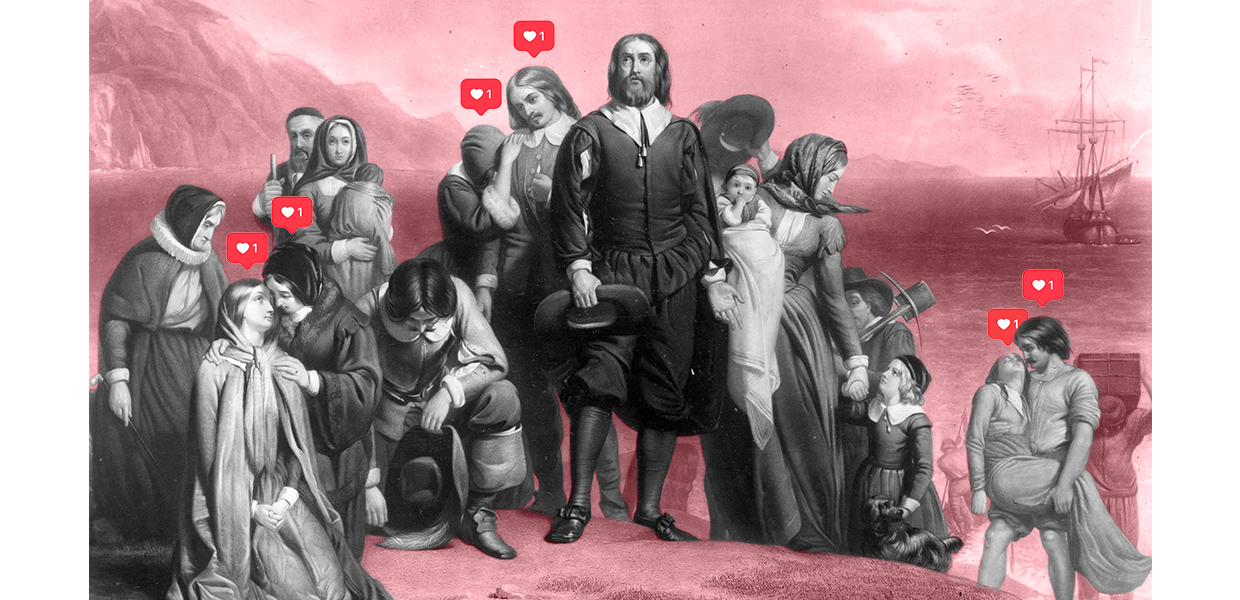America's historical problem with romance
The French had their troubadours and the English their Arthurian legends. Here in America we have… Puritans!


A free daily email with the biggest news stories of the day – and the best features from TheWeek.com
You are now subscribed
Your newsletter sign-up was successful
Valentine's Day is the cruelest of holidays. Every Feb. 14, we must prepare ourselves for an explosion of hearts, lace, and rom-com marathons. The children forget about cooties for 48 hours while they draw hearts and flowers on two-dozen kiddie valentines. Schmaltzy pop songs play from every speaker. All this in celebration of something that everyone wants and too few enjoy: a beautiful, fulfilling, lasting romantic love.
Everyone knows by now that we're living in a society of haves and have-nots. The love gap is one of the grimmest, though. By most accounts, Americans are as lonely today as we've ever been. Marriage rates have been declining for several years; even sex seems to be going out of style. Loneliness is not good for us, either personally or politically, but in our hyper-connected and fast-paced world, it seems strangely difficult to forge the lasting bonds that most of us deeply desire. Despite everything, we continue to set aside Feb. 14 to celebrate the happily-paired, while inviting commercial America to rub salt in the wounds of the loveless. Seriously, how have we not already canceled this day?
Thinking constructively, we could see Valentine's Day as an opportunity to work on the problem. Romance is in trouble. It's in everyone's interests to try and save it, and our more thoughtful sociologists have some interesting ideas. If we dig into this, though, it may turn out that the problem goes deeper than weak labor markets and changing social mores. Honestly, have Americans ever been particularly good lovers?
The Week
Escape your echo chamber. Get the facts behind the news, plus analysis from multiple perspectives.

Sign up for The Week's Free Newsletters
From our morning news briefing to a weekly Good News Newsletter, get the best of The Week delivered directly to your inbox.
From our morning news briefing to a weekly Good News Newsletter, get the best of The Week delivered directly to your inbox.
We shouldn't make too much of stereotypes, but let's reflect for just a moment on cultural reputation. The Mediterranean cultures are famous for their passion and appreciation of beauty. Latin America has a similar stature. There's a reason why women tend to find French, Italian, and Spanish accents sexy. By contrast, what image do we attach to the fine, upstanding, patriotic, healthy, normal American boy? He's a great soldier and quite possibly a future CEO, but how is he as a lover? Maybe we'd prefer not to answer.
Turning to poetry and literature, we find vindication for some cultures with less-romantic reputations. Unfortunately, ours isn't among them. The Germans and English tend to be remembered for their industrial and military prowess, as well as for cultural mores that stress the value of discipline and dignity. We don't think of them as hot-blooded exhibitionists. Nevertheless, both cultures boast an impressive list of romantic poets and novelists, from Heinrich Heine to Lord Byron. The English produced Jane Austen and, of course, the Bard himself. Germany gave the world Johann Wolfgang von Goethe. Over here we've got John Steinbeck, Flannery O'Connor, Jack London, and Herman Melville. Americans clearly excel at dramatizing the human spirit's struggle to triumph over adverse circumstances. But have you seen the white whale on a Valentine's card? There's probably a reason for that.
Looking back at our history and founding mythology, we may begin to appreciate the problem. The French had their troubadours and the English their Arthurian legends. Indian culture has the Kamasutra along with plenty of erotic imagery from the Vedas. The Hebrew Bible includes the Song of Songs and some surprisingly satisfying love stories, while the ancient Greeks and Romans had a whole cast of romantic deities: Cupid, Psyche, Aphrodite.
Here in America we have… Puritans! Was sex even allowed on the Mayflower? When we think of the origins of our own nation, we envision Colonial Williamsburg, Valley Forge, and the First Continental Congress. Admittedly, those scenes involve a lot of sweaty men, but The Federalist Papers aren't a great aphrodisiac. If young women come into the narrative at all, it's probably through the Salem Witch Trials. Even Love Potion No. 9 can't make that story sexy.
A free daily email with the biggest news stories of the day – and the best features from TheWeek.com
Those early Americans must have had sex every once in awhile (except for the Shakers, who literally did not permit it), but they weren't much inclined to celebrate the fact. Undoubtedly, Americans have left our mark on history, as inventors, explorers, and great humanitarians. We piloted a new form of government. We settled the West. We built skyscrapers. We won two World Wars. Our history is studded with amazing accomplishments, as numerous as the stars on our flag. In general though, we've been a practical and hardworking people more than a sensual one. We seem to be builders and fighters more than lovers.
Even in the '60s, when we rebelled against the propriety of our forefathers, the romantic "tradition" we authored leaves much to be desired. We have our low-culture burlesques now, but too often we seem more horny than inspired. The love shack stands as the American version of a romantic tryst. Casanova (a violinist) serenaded women in gondolas. Hugh Hefner dressed them in bunny suits. Can drug-addled beatniks and back-seat teen-aged lovers hold a scented candle to the noble Lancelot or to Romeo under the balcony? Even many of our favorite love songs were written by foreigners.
Americans, it's time to pull ourselves together. As a can-do culture, we have to be able to fix this. It’s time to worry less about R-E-S-P-E-C-T, and more about finding that chapel of love. That means, in the first place, that we need to work on our romantic tradition. Good loving requires rituals, and unbuckling your pants doesn't count. Watch a few operas to get some ideas. Go to an art exhibit. Read Plato's Symposium. When the muses start to stir, consider how we might put an American spin on the tale as old as time. February is a chilly month for balcony-climbing, but maybe we could do something with ice castles or horse-drawn carriages? Let's get to work.
Be prepared to exert yourself. Precious things are rarely free or easy. Indeed, one problem with our culture may be our fixation on effectiveness, efficiency, and success. Romance consumes enormous energy and often ends in failure or even tragedy. It's quite impractical, honestly. It also makes life worth living.
Valentine's Day can be one of the worst American holidays, but we could make it one of the best. If you're spending this day unhappily alone, consider that literally millions of your compatriots are probably doing the same. There is a solution to this problem. Go find one, and make it a love for the ages.
Rachel Lu is a writer based in Roseville, Minnesota. Her work has appeared in many publications, including National Review, The American Conservative, America Magazine, and The Federalist. She previously worked as an academic philosopher, and is a Robert Novak Journalism Fellow.
-
 Switzerland could vote to cap its population
Switzerland could vote to cap its populationUnder the Radar Swiss People’s Party proposes referendum on radical anti-immigration measure to limit residents to 10 million
-
 Political cartoons for February 15
Political cartoons for February 15Cartoons Sunday's political cartoons include political ventriloquism, Europe in the middle, and more
-
 The broken water companies failing England and Wales
The broken water companies failing England and WalesExplainer With rising bills, deteriorating river health and a lack of investment, regulators face an uphill battle to stabilise the industry
